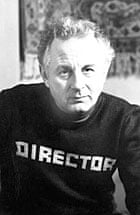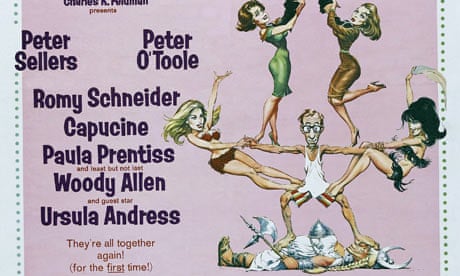For a few years in the 1960s, Clive Donner, who has died aged 84 after suffering from Alzheimer's disease, was among the leading film directors of swinging London. Unfortunately, when London stopped swinging, so did Donner. The four films that made his name were a low-budget adaptation of Harold Pinter's play The Caretaker (1963); Nothing But the Best (1964), a wicked satire on the British class structure; the farcical What's New Pussycat? (1965); and the coming-of-age comedy Here We Go Round the Mulberry Bush (1968).
Already in his 30s when he started directing, Donner gained a reputation for being tuned in to "youth". His debut movie, The Secret Place (1957), a heist drama shot on location in the East End, had David McCallum as a Brandoesque leather-jacketed "crazy mixed-up kid".
The Heart of a Child (1958) concerned a boy and his St Bernard dog, Rudi, in the Alps. When his father (unpleasant Donald Pleasence) decides to sell the pet to the local butcher, the dog runs away. "Rudi, come home! I won't let them turn you into sausages!" the boy cries.
Some People (1962), filmed on location in Bristol, was unabashed publicity for the Duke of Edinburgh's award scheme – with its profits going to that organisation. It centred on three alienated youths who are encouraged by a liberal-minded choirmaster, Mr Smith (Kenneth More), to form a rock band.
Donner was born in West Hampstead, London. His grandparents were Polish immigrants, his father was a concert violinist and his mother ran a dress shop. Aged 17, after leaving Kilburn polytechnic and starting work as an office clerk, he went to Denham Studios, in Buckinghamshire, for one of his father's recording sessions for The Life and Death of Colonel Blimp (1943).

Michael Powell, the film's director, got the young man a job in the cutting rooms there. Donner worked on a number of films before national service in the Royal Army Educational Corps, and then gained experience at nearby Pinewood Studios as an editor on such films as Scrooge (1951), The Card (1952) and Genevieve (1953). After directing his first features, Donner worked in television while struggling to get The Caretaker made. Finally, a consortium including Elizabeth Taylor, Richard Burton, Noël Coward and Peter Sellers put up a minimum of £1,000 each.
The film starred Alan Bates and Pleasence, who had created the roles on stage, and it won the silver bear at the 1963 Berlin Film Festival. Faithful to the claustrophobic comic menace of the stage play, with Donner's use of closeups and the atmospheric black-and-white cinematography by Nicolas Roeg, it avoids the label of filmed theatre.
Nothing But the Best, written by Frederic Raphael, starred Bates as an opportunistic young clerk who wants to crash into the upper classes. He is taught by Denholm Elliott, a down-at-heel gent, to pass himself off as a toff. Shot in bright colours by Roeg, the film captures the 60s' shallow glitter.
Heralded by Tom Jones in Burt Bacharach's title song, What's New Pussycat? is a wildly undisciplined sex comedy with Peter Sellers as a crazy psychiatrist, and a bevy of "pussycats", called such by Peter O'Toole, the libidinous hero. Woody Allen, who is credited with the screenplay and makes his feature film debut, loathed it, claiming that his script was butchered. It was a huge box office success, and Donner's biggest hit.
It was followed by Luv (1967), his biggest flop. Extremely bankable after Pussycat, Donner was invited to Hollywood to direct Jack Lemmon, Peter Falk and Elaine May in an adaptation of Murray Schisgal's Broadway three-hander. Disastrously opened out, it was played and directed in a leaden manner.
Donner's next project, back in Britain, was Here We Go Round the Mulberry Bush, written by Hunter Davies and set in the Hertfordshire new town of Stevenage, where Barry Evans is the 17-year-old virgin desperate to get laid in the new sexually permissive society. Now dated, though about to be released on DVD, it reflects many of the mores, modes and music of the period.
Alfred the Great (1969) was an ambitious attempt to escape into the past, though David Hemmings carried over his trendy Blow-Up image into his portrayal of the 9th-century king of the Anglo-Saxons, faced with Michael York as the savage Viking Guthrum. The epic failed to please the critics and the public, but at least enabled Donner to meet Australian-born Jocelyn Rickards, who designed its costumes. They were married soon after, and remained so until her death in 2005.
Active as a director of TV commercials and movies till the mid-90s, Donner returned intermittently to feature films. The TV movies were mostly remakes of better films, such as Oliver Twist (1982) and A Christmas Carol (1984), both with a hammy George C Scott as Scrooge and Fagin respectively. However, Rogue Male (1976), a remake of Fritz Lang's Man Hunt (1941), was one of Donner's best, and his favourite. Well-paced and well-written, again by Raphael, it starred O'Toole as an aristocrat who plans to assassinate Hitler before war becomes inevitable.
The features were a diverse bunch: a Dracula spoof, Vampira (1974), starring a bloodless David Niven, whose castle has been taken over by Playboy bunnies; The Nude Bomb (1980), a spin-off of the 60s sitcom Get Smart; the embarrassing Charlie Chan and the Curse of the Dragon Queen (1981), with Peter Ustinov as the oriental detective; and Stealing Heaven (1988), a soft-focus erotic telling of the story of the 12th-century lovers Heloise and Abelard.
Donner got more satisfaction out of his one opportunity to direct a stage play, in 1974, with Kennedy's Children by Robert Patrick, at the King's Head pub theatre in Islington, north London. It transferred to the Arts theatre in the West End, and then to Broadway. Written in alternating monologues, the play concerned five people in a New York bar reminiscing about the 60s and the downward spiral of their lives since the days of youthful idealism – something Donner must have understood.
